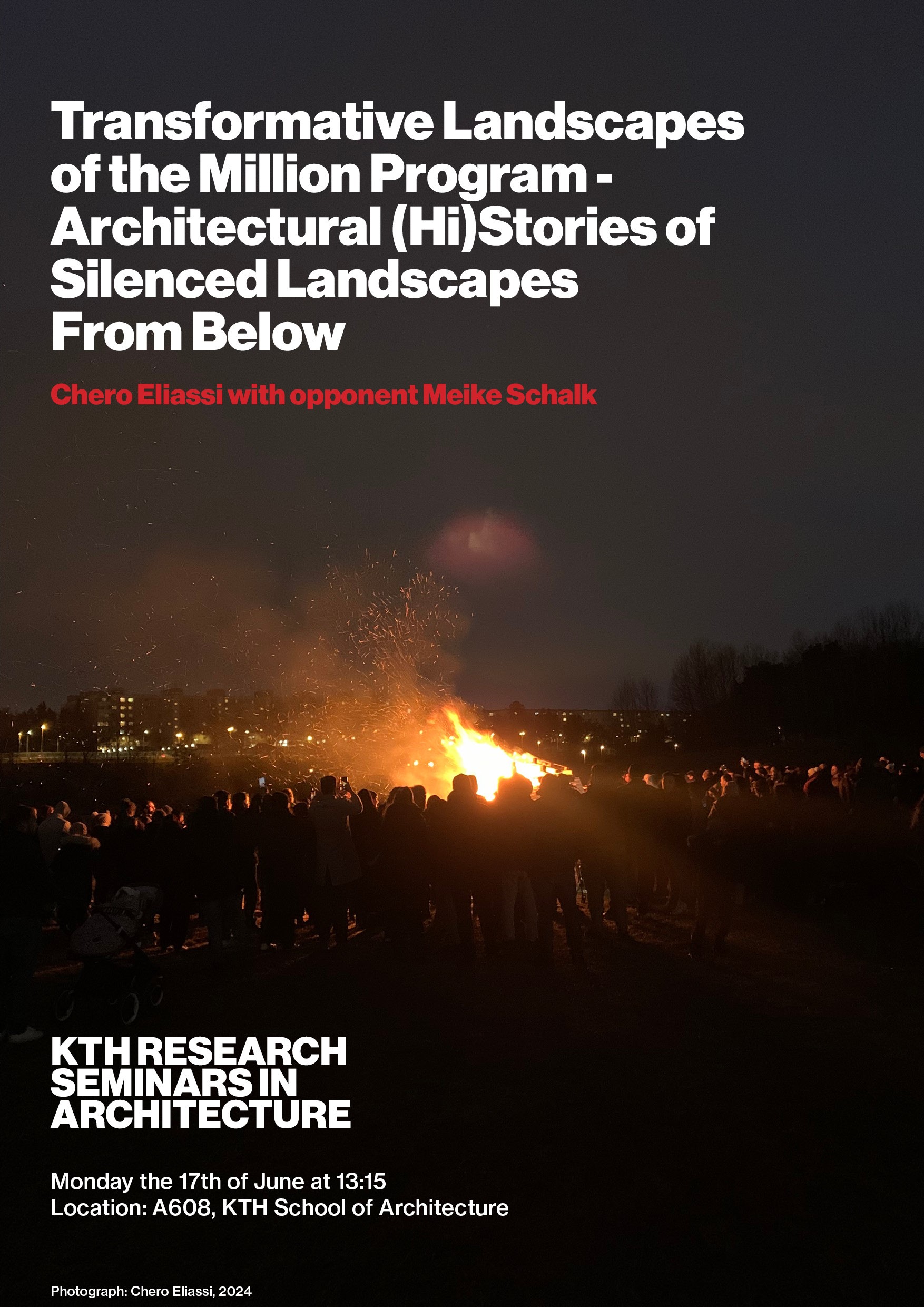Transformative Landscapes of the Million Program
- Architectural (Hi)Stories of Silenced Landscapes From Below

On the 17th of June we end the 2023-2024 Research in Architecture Seminar sessions with PhD candidate Chero Eliassi who will be presenting her research project: Transformative Landscapes of the Million Program - Architectural (Hi)Stories of Silenced Landscapes From Below. The opponent will be Associate Professor Meike Shalk.
Tid: Må 2024-06-17 kl 13.15 - 16.00
Plats: Conference Room 6th Floor of the Architecture School Room A608
Videolänk: https://kth-se.zoom.us/j/67185547897
Abstract:
When the Million Program was constructed in Swedish cities from 1965 to 1974, the outdoor environments often remained incomplete sites of construction. Based on national guidelines, regulations, and visions of planners, architects, and politicians at the time, rationalized and standardized outdoor spaces began to take shape. These landscapes were soon stigmatized and questioned by media, critics, government officials, and some residents, and hence subject to renovation and transformation. This manuscript investigates the transformation and production of spatial cultures, including both humans and non-humans, in multi-family housing areas of the Million Program, from its construction to the present day. With ethnographic, landscape, and spatial research methods applied in case studies, the research explores spatial practices, transnationalism, diasporic cultures, as well as how people understand themselves to belong in these Swedish landscapes of social housing, and the concept of “welfare landscapes”, where the social welfare and the individual wellbeing of the inhabitants were prioritized during the upcoming of the politics of the welfare state. Furthermore, I analyze how these landscapes meet questions of health, well-being, ecological practices, materialism, collective belonging, and internationalization and how various municipal processes function with (or without) citizen engagement. The study relies on feminist and architectural theory, as well as methods and approaches from cultural and social anthropology. The research question that leads the dissertation is: “How have residents and other living beings, objects, and politics of the Million Program’s transformed its landscapes since its completion?”. By presenting an analysis of social, spatial, ecological, cultural, and non-human narratives, this research contributes to the literature on landscape architectural knowledge production and anthropology.
Opponent: Meike Shalk
Meike Schalk is an architect and Associate Professor in Urban Design and Urban Theory at KTH School of Architecture. She often works in transdisciplinary constellations where she combines critical inquiry into discourses of sustainability, democracy and civic involvement in planning and design with practice-oriented research methods. Her research focuses on four overlapping areas, research through a feminist lens; the current economical, physical, and social transformations of welfare housing; the segregated city from young people’s perspectives; and civic movements.
Bio Chero Eliass:
Chero Eliassi is a landscape architect and, since 2021, a doctoral student in Jennifer Mack’s research project entitled “Parks around the Towers” at the Royal Institute of Technology (KTH). Eliassi’s research critically examines how the outdoor environments of the Swedish Million Program landscapes, built between 1965 and 1974, have transformed and been utilized through social, ecological, political, and spatial perspectives. During her doctoral studies, Eliassi has focused on the material of sand in a playground in Norrliden, Kalmar, using it to trace the various changes that have shaped the playground since its construction in the late 1960s. Additionally, Eliassi has explored the therapeutic values of plants, cultivation, and collective belonging among migrants in Holma, Malmö, as well as the cultural and spatial practice of “Newroz” in Järva Field, Stockholm, in relation to its practice in the imagined homeland, Kurdistan. Eliassi’s research investigates how these diverse outdoor environments from the 1960s and 1970s can be considered part of Sweden's landscape cultural heritage.
